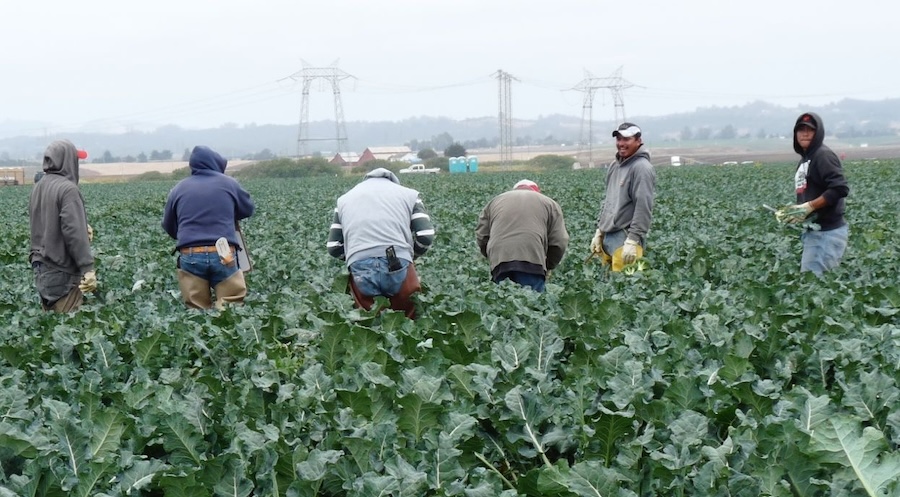
Commission on Agricultural Workers
Report - Sunday, November 1, 1992
Immigration Levels at the time of the final report:
- Average annual legal immigration: 1,039,000
- Average annual deportations + voluntary departures: 1,118,000
- Estimated illegal population: 5,000,000
The Commission on Agricultural Workers was created by section 304 of the Immigration Reform and Control Act of 1986 (IRCA). This 11-member, bipartisan panel was comprised of growers, union representatives, academics, civil servants, and clergy.
The law that established the Commission is a case study of unintended consequences. It granted amnesty to 1.1 million illegal aliens who said they had worked in agriculture and another 1.6 million who said they had lived in the United States since at least January 1, 1982. In exchange for these amnesties, those who wanted illegal immigration brought under control were promised that employers who knowingly hired illegal aliens would be sanctioned. As so often happens in “deals” like this, the amnesty was implemented fully and effectively, but employer sanctions have yet to be tried in any comprehensive way.
The Commission was tasked with examining what impact the amnesty for Special Agricultural Workers (SAWs) had on the domestic farm labor supply, working conditions, and wages. Six years after IRCA, the Commission found that the same problems in the agricultural industry persist:
- The living and working conditions of farm workers had not improved;
- Wages have remained stagnant;
- Increasing numbers of new illegal aliens are arriving to compete for the same, small number of jobs, and thus reducing the work hours available to each worker and contributing to lower annual earnings.
- “Rather than a stabilization of the labor supply, there is a general oversupply of farm labor nationwide,” as illegal aliens are continuously added to the pool. In fact, during the peak season, the United States has slightly more than 1 million farmworker jobs, but approximately 2.5 million farmworkers. The law of supply and demand ensures that an imbalance of this degree results in atrocious wages and working conditions. Since 1977—when the conditions of farmworkers routinely were described in news features as heartbreaking—real income has dropped every year except in 1986. Farmworkers now find work during fewer weeks of the year; they work shorter weeks when they do get jobs; and they make less money per hour. Half the workers have incomes below the poverty level, even accounting for jobs they find outside agriculture.
- Virtually all workers who hold seasonal agricultural jobs are unemployed at some point during the year. “The extent of unemployment and underemployment is influenced strongly by the supply of labor, crop size and prices, and the availability and quality of mechanisms for matching workers with jobs. Since IRCA, largely because of labor surpluses, unemployment rates among farmworkers have remained high.”
- Amnesties like IRCA invite fraud. As many as 70 percent of the applications for the SAW amnesty involved fraud or misrepresentation.
The Commission made its views on the value of future agricultural amnesty programs crystal clear:
In retrospect, the concept of a worker-specific and industry-specific legalization program was fundamentally flawed.
Worker-specific and/or industry-specific legalization programs as contained in IRCA should not be the basis of future immigration policy.
Concerns that treating farmworkers with dignity will drive the price of food unacceptably high have no basis in reality, argues Philip L. Martin, a professor of agricultural economics at the University of California-Davis and a member of the Commission. One first has to remember that foreign-born laborers work with only about 20 percent of all the food harvested in the United States (most is handled mechanically). Congress is running an immigration program that impoverishes a couple of million seasonal farmworkers and their families, and yet the effect for the average American family is that the food bill is just pennies lower than if the farmworkers were paid enough to rise above poverty.
According to Professor Martin, the wages paid to farmworkers typically account for only about 10 percent of the retail price of a number of crops. In other words, farm wages could be doubled and poverty among farmworkers could be virtually eliminated while adding only about 10 cents to the cost of a head of lettuce. In actuality, Martin and others say, the price of food probably would not go up at all. Tighter labor markets would encourage more mechanization to keep prices down. Tomato farmers claimed in the early 1960s that their industry would not survive if a program for temporary guest farmworkers was halted. But when it was stopped, the farmers mechanized in a manner that quadrupled production and led to the price of ketchup and other tomato products dropping for consumers.
According to the Commission, there is no future in American farmers trying to compete with Third World countries on the basis of their low wages. The ability to compete is and will be based on America's "advantages of a highly-developed infrastructure, high-quality produce and the ability to offset higher labor costs with greater productivity." Immigration has merely retarded some of the agricultural industry's movement to better technological and organizational practices.
The Commission also addressed illegal immigration more broadly:
Illegal immigration must be curtailed. This should be accomplished with more effective border controls, better internal apprehension mechanisms, and enhanced enforcement of employer sanctions. The U.S. government should also develop a better employment eligibility and identification system, including a fraud-proof work authorization document for all persons legally authorized to work in the United States, so that employer sanctions can more effectively deter the employment of unauthorized workers.
Download Report

Fact Sheet - The U.S. Immigration System

Fact Sheet - Visa Waiver Program: Legal Open Borders for the Developed World

Fact Sheet - EB-3: Third in Preference, Last in Our Hearts

Fact Sheet - Temporary Protected Status: De Facto Amnesty

Fact Sheet - The Visa Lottery: Surrendering Sovereignty to Random Chance
